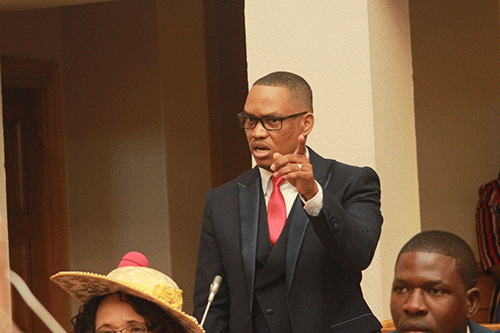President Hage Geingob usurped the constitutional mandate of the National Assembly when he appointed a special envoy to lead discussions on genocide between Namibia and Germany.
This position was held by the Landless People’s Movement (LPM), Ovaherero Traditional Authority (OTA) and the Nama Traditional Leaders Association (NTLA) at a joint press conference yesterday.
The organisations have also reiterated their firm objection to a draft genocide declaration signed between Namibia and Germany.
The presser follows a leaked dossier, dated 13 September 2022, containing the group’s demands, addressed to the government’s chief legal advisor, attorney general Festus Mbandeka.
The group gave Mbandeka until 30 September 2022 to respond, failure to which they will drag government to court.
Leading the discussion on the day was LPM leader and chief-change-campaigner (LCCC) Bernadus Swartbooi.
“The President and the Cabinet appointed late ambassador Zed Ngavirue as special envoy on his and Cabinet’s behalf to execute the mandate of the National Assembly,” Swartbooi said in no uncertain terms.
It was vintage Swartbooi, as he did not mince his words.
“The National Assembly obtained a motion in parliament, tabled by the late chief Kuaima Riruako. As the house that represents the people of this country, that house began to deliberate with the Federal Republic of Germany and particularly the Bundestag,” he said.
According to the LPM firebrand, the genocide discussion was supposed to be between the German and Namibian parliaments.
“The appointment of an envoy by a president and his Cabinet on their behalf began to usurp the constitutional mandate of the National Assembly and took the matter out of the hands of the National Assembly unconstitutionally and illegally, and made it a matter of the executive branch of the state,” he said.
In the eyes of the former //Kharas governor, this flies in the face of the doctrine of separation of power between the three arms of state; the judiciary, executive and legislature.
“I am part of the litigation because, as an elected representative of the National Assembly, the constituency I serve are the people of this country, Namibia.
“I represent all those communities all over Namibia, including the victims of the genocide afflicted communities; it was appropriate for me to begin a process of testing the local jurisdiction,” he said before turning to Cabinet.
“Cabinet is something appointed by the president at his own behest, whereas parliament is elected by the popular will of the people of this country,” he buttressed.
Swartbooi was unequivocal in their demands to government.
“They must accept that they are in transgression of the constitution. That they have usurped the power and authority of the National Assembly, which was the sole institution that was to work on the issue of genocide, and that if it then wanted the executive to come in, a resolution to that effect should have been taken by the National Assembly to that effect… there is no such resolution.”
The lawyer-cum-politician then rejected the N$18 billion development aid, masquerading as genocide reparations offered by Germany.
“[We want] full reparations in terms of the legal and historic definition under international law of what constitutes reparation – not a development grant,” he stressed.
Presidential spokesperson Alfredo Hengari did not respond to questions sent to him yesterday.
Chief Rukambe Uazukuani stood in for OTA paramount chief claimant, academic Mutjinde Katjiua, who was in transit from neighbouring Botswana on an official mission.
“There is no need to rush because we don’t want to eat today… I urge fellow chiefs not to let our hunger of today deprive our future generations of what they deserve,” Uazukuani asserted.
He lamented the fact that through genocidal acts of the German oppressors, the Nama and Ovaherero communities are displaced, without land and swimming in a pool of poverty.
“Being a Nama or Herero does not make us second-class citizens in this country. We have the right to speak for ourselves or be spoken for by our legitimate representatives,” he said, seemingly swiping at government’s purported suppression of discerning voices.
Uazukuani does not recognise the government-led genocide talks.
“People say the deal must be renegotiated. But there was no process to start with,” he said.
Their comments come hot on the heels of reports that Germany is determined to shove the disputed N$18 billion deal as reparation for the former’s colonial-era genocide down Namibia’s throat by any means necessary.
Germany massacred an estimated 80 000 Ovaherero and Nama at the turn of the 20th century.
In September last year, defence minister Frans Kapofi tabled a motion on the genocide reparation pact between Namibia and Germany in the National Assembly.
At the time, many in Namibia, including all opposition parties in parliament, as well as traditional leaders of the affected communities, rejected the deal, branding it as an insult.
Namibia’s President Hage Geingob too rued the amount as insufficient to repair the wounds.
It is Geingob’s view that negotiations should continue to avoid losing the gains made through protracted talks, spanning five years.
Six years ago, both governments entered into negotiations about a formal German apology for the colonial-era killings.
Some opposition leaders, including Popular Democratic Movement’s McHenry Venaani, are pushing for fresh talks on genocide.
– emumbuu@nepc.com.na
Caption: (Hijacked )



